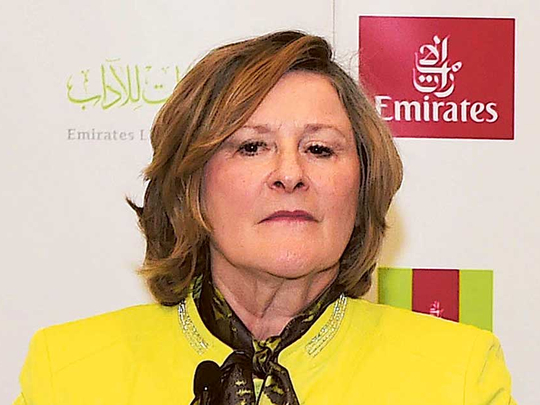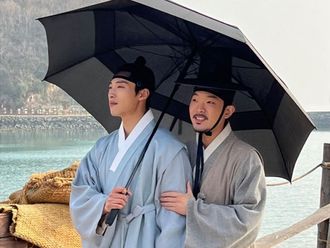
Dubai: Some of the best-selling books in the world have been translated into many languages, and while we know who the authors of these books are, we rarely know the translators that made it possible for you to experience the book although it was not originally written in a language you understand. To shed more light on the challenges and nuances of translation, the Emirates Literature Foundation, in partnership with the Dubai Executive Council, will be hosting the first Dubai Translation Conference between October 20 and 22.
Isobel Abulhoul, OBE, CEO and trustee of the Emirates Literature Foundation and director of the Emirates Airline Festival of Literature, told Gulf News about why people should come to the conference.
The Bridges of Constantine |
“Translation has an impact on all of us. Whether it is through road signs, subtitles in films or books we read, legal contracts, medicines, diagnoses, or wherever you look,” she said.
The conference, she said, is born out of the Emirates Literature Foundation’s key vision, which is to ensure there are “wonderful interesting and world-changing books available in both Arabic and English”.
“Translation conferences have this persona of being academic, and slightly dull,” Abulhoul said, but as organisers, she said their aim is to change that. “Our ambition as organisers is to make it interesting, stimulating and fun; and you do not often hear these words at translation conferences, but we have done our best.”
The event celebrates the ideals of the National Reading Policy, launched in the United Arab Emirates in 2016, and is another step towards enriching the body of literature in Arabic Language, promoting the creative content of Arab writers to non-Arabic speakers and promoting a reading culture within the Arab world.
Isobel said translation in literature is a key interest for her, “the ability for a translator to allow us into a different world via a different language, by doing a seamless job of capturing literature in translation.”
“The translator is invisible to most of us, we know the authors, but we never really give any attention or thanks to the person who brings this literature to us in a different language,” she said.
The conference will host 22 speakers, including the famous Ahlam Mosteghanemi and her translator Nancy Roberts.
“She will be doing a special session on the third evening of the conference and as the foremost and most famous best-selling author from the Arab world, I am so delighted that she is able to join us and that we can read the book even if we are not Arabic speakers.”
In its first year, the conference will be focusing on two languages — Arabic and English — because these are the ones that have the most impact currently.
“The vision is that with each year, we will have an additional focus language,” she said.
“We never want to be lost in translation. All of us can have funny stories of things being completely misunderstood between languages. It could be really funny, but also very serious,” which is why the conference will have specialist seminars on legal and medical translation.
“We also have sessions on subtitles that we see in cinema and films, and we look at how well they are done, and how easy is it for translators to do that,” Abulhoul explained.
There are also sessions on the untranslatable, proverbs. “We are looking at words that slip from one language to another and we are looking at translations of translations.”
She said there is something for everyone, but they are targeting translation professionals, or anyone who has an interest in translation or people who are actually involved in translation.
Students are also another group they are focusing on, as they are the future generation of translators.
“We are also looking at writers, for them to have access to some of the best translators in the world, I think, is a great benefit and to find out really what a translator does.” Abulhoul noted.
There are international delegates attending the conference too.
A session called “Google translate and other joys”, will also look at technology’s impact on translators and their translations.
“A lot of translators are not happy [about google translate], but it is the future and it is getting better and better,” she said, adding that people should be embracing technology, as there will always be a human element because software cannot convey emotion.
Box 1:
Arabic sign language
Dubai: One of the seminars at the Dubai Translation Conference is about Arabic Sign language.
Isobel Abulhoul, OBE, CEO and trustee of the Emirates Literature Foundation and director of the Emirates Airline Festival of Literature, told Gulf News that the session will have some of the best Arabic language sign language interpreters, who will give an introduction to sign language.
She said sign language is another form of translation.
“It is important for us to be inclusive in the events we do, so I am hoping this seminar will interest students particularly and get them to think of learning sign language and becoming a conduit, so people with hearing-impairment can come along to events and not miss out,” Abulhoul said.
She added that the keynote speeches will be given by Shaikh Nahyan Bin Mubarak Al Nahyan, Minister of Culture and Knowledge Development; Shaikha Lubna Al Qasimi, Minister of State for Tolerance; and Abdullah Abdul Rahman Al Shaibani, secretary-general of the Dubai Executive Council.
Box 2:
What: The Dubai Translation Conference
When: October 20-22
Where: Mohammad Bin Rashid University of Medicine and Health Sciences — Dubai
Fee: Free for UAE residents who register online — courtesy of the Executive Council
The conference is held under the patronage of Shaikh Ahmad Bin Saeed Al Maktoum, chairman of Emirates Literature Foundation










